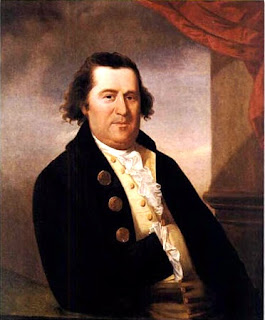They called him Billy. His real name was William Dawes, Jr., ancestor of Marietta’s noted Dawes family. He rode with Paul Revere on his famous 1775 midnight ride. But Dawes was left out of the story, along with a third rider, Dr. Samuel Prescott. To paraphrase author Christopher Klein, “While Paul Revere galloped into history, his fellow rider(s) William Dawes (and Samuel Prescott) galloped into undeserved oblivion.”
The popular though inaccurate story comes from Henry Wadsworth Longfellow’s 1861 poem “The Midnight Ride of Paul Revere.” Longfellow wrote it to inspire patriotic fervor just prior to the Civil War. He simplified the facts to make it more memorable to readers. He succeeded.
So, what really happened? On April 18, 1775, 700 British soldiers were on the move to destroy military supplies at Concord, Massachusetts. Colonists learned of the British action, though they believed their objective was to arrest patriot leaders Samuel Adams and John Hancock at Lexington. They sprang into action to warn them. It wasn’t just Paul Revere. Patriot activist Dr. Joseph Warren assigned two riders to take alternate routes in case one was captured. Revere also arranged for the lantern signal at Old North Church to alert others.
Billy Dawes was the first rider, dispatched at 9:00 pm, prompting his descendants to label him “First Rider of Revolution.” He had a longer and riskier route through the British checkpoint at Boston Neck. Dawes had unique qualifications for this mission. He was a trusted patriot and member of the Massachusetts militia, The Ancient and Honorable Artillery Company. Billy often spied on the British in plain sight, posing as a tipsy farmer or quaffing a pint while listening to British loyalists in taverns.
Paul Revere started around 10:00 pm. He was ferried across the Charles River, procured a horse from Deacon Larkin, and headed for Lexington.He arrived first at midnight to warn Adams and Hancock. Where was Dawes? “He must have been stopped,” thought Revere. Dawes arrived at 12:30. They then realized that the British had a bigger objective in mind: the military supplies at Concord. The two set off urgently to notify local defenders. On the way they met Dr. Samuel Prescott as he was returning from visiting his sweetheart in Concord. After ascertaining that he was a loyal patriot, he joined Dawes and Revere. Prescott used his knowledge of local people to spread the word.
Ironically, neither Paul Revere nor Billy Dawes made it to Concord. They and Prescott were surrounded by a British patrol. Revere was captured, interrogated, and released - without his horse. He returned to Lexington. Dawes escaped but soon after was thrown by his horse which ran off. He lost his watch. Only Prescott, the local guy who volunteered on the spot, evaded the British and warned Concord.
All three riders courageously did their job by notifying crucial people on their routes. The Minutemen responded. Hostilities began at dawn on April 19, 1775, with “the shot heard round the world.” Patriot militias drove the British force back to Boston. The Revolutionary War had begun.
Yes, Paul Revere played an important role in patriot resistance and as a rider that night. But the warning to Lexington and Concord that “The British are coming!” was truly a team effort.
William Dawes, Jr. found his lost watch, continued to help the patriot cause, served as a quartermaster during the war, and later operated a grocery business. His great grandson was General Rufus Dawes of Marietta.
Dr. Joseph Warren died at the Battle of Bunker Hill just two months later. Samuel Prescott never married his sweetheart; he died in 1777 as a prisoner of war. Paul Revere remained an active patriot, suffered through a disastrous command in the war, and continued as a successful businessman in Boston.

No comments:
Post a Comment